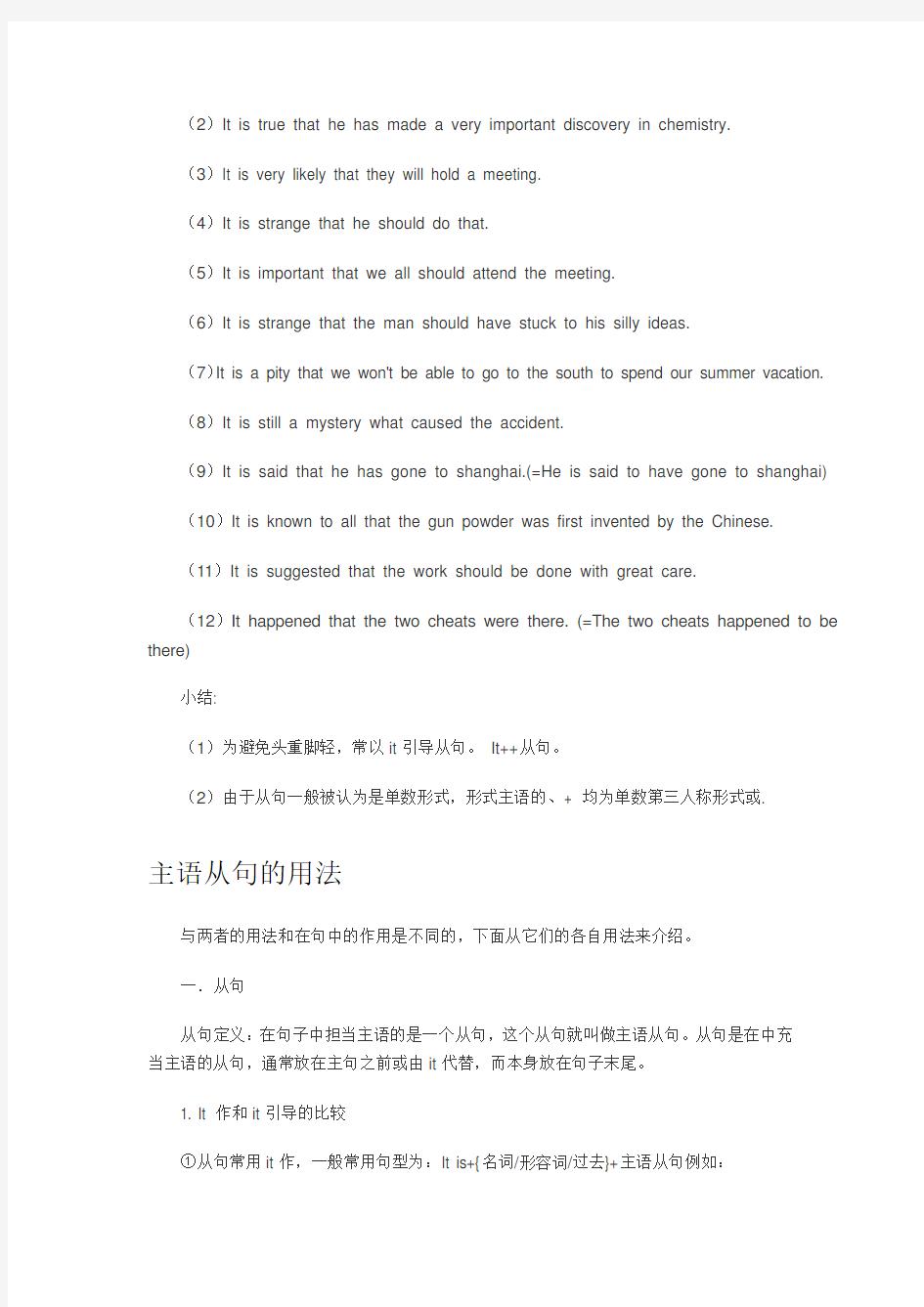主语从句非限制定语从句


主语从句
一定义:在中充当成分的句子叫做主语从句。
二主语充当主语的句子类型:
1.常规从句,即句子在中充当一个;从句的不受主句的时态影响和限制。
(1)That he finished writing the composition in such a short time surprised us all.
(2)Whether we will go for an outing tomorrow remains unknown.
(3)Who will be our monitor hasn't been decided yet.
(4)Whom we must study for is a question of great importance.
(5)What caused the accident remains unknown.
(6)Whatever you did is right.
(7)Who the watch belongs to is unknown.
(8)What we need is time.
(9)What we need are good doctors.
小结:
(1)引导从句有that,whether,who,what,whatever等;
(2)位于句首不能省略;
(3)从句大多数情况下视为,但也有例外,如例(9)
注意:当what引导的名词性分句作主语时,问题极为复杂。
2. 为了防止句子,通常把it放在句首位置,真正主语搁置于句末
(1)It is certain that he will win the match.
(2)It is true that he has made a very important discovery in chemistry.
(3)It is very likely that they will hold a meeting.
(4)It is strange that he should do that.
(5)It is important that we all should attend the meeting.
(6)It is strange that the man should have stuck to his silly ideas.
(7)It is a pity that we won't be able to go to the south to spend our summer vacation.
(8)It is still a mystery what caused the accident.
(9)It is said that he has gone to shanghai.(=He is said to have gone to shanghai) (10)It is known to all that the gun powder was first invented by the Chinese.
(11)It is suggested that the work should be done with great care.
(12)It happened that the two cheats were there. (=The two cheats happened to be there)
小结:
(1)为避免头重脚轻,常以it引导从句。It++从句。
(2)由于从句一般被认为是单数形式,形式主语的、+ 均为单数第三人称形式或. 主语从句的用法
与两者的用法和在句中的作用是不同的,下面从它们的各自用法来介绍。
一.从句
从句定义:在句子中担当主语的是一个从句,这个从句就叫做主语从句。从句是在中充当主语的从句,通常放在主句之前或由it代替,而本身放在句子末尾。
1. It 作和it引导的比较
①从句常用it作,一般常用句型为:It is+{名词/形容词/过去}+主语从句例如:
It is still a question whether she will come or not.
It is strange that you should like him.
It is still unknown which team will win the match.
另外,还有一些比较多见的结构:
It turned out that……;
It has been proved that……;
It happened/occurred that……;
It is well-known that……等等
②而则不同,它的结构是:It+be+被强调部分+that+从句
强调:It is the times that produce their heroes.
强调宾语:It is English that Prof.Lin teaches us.
强调:It was in shanghai that I saw the film.
判断是否是有一个方法,就是将that以后的“句子的其余部分”拿出来单独看,看有没有缺成分,缺的是什么成分,再把后面that前面的那部分,带到你认为缺成分的地方,如果放进去是一句完整的句子了,那就说明是强调句。
2. 用it 作的结构
(1) It is +名词+that从句
It is a fact that …事实是……
It is an honor that …非常荣幸
It is common knowledge that …是常识
(2) it is +形容词+that从句
It is natural that…很自然……
It is strange that…奇怪的是……
(3) it ++that从句
It seems that…似乎……
It happened that…碰巧……
(4) it is+过去+that从句
It is reported that…据报道……
It has been proved that…已证实……
3.从句不可位于句首的五种情况
(1) if 引导的从句不可居于句首。
(2) It is said , (reported) …结构中的从句不可提前。例如:
It is said that President Jingo will visit our school next week.
(3) It happens…, It occurs…结构中的从句不可提前。例如:
It occurred to him that he failed in the examination.
(4) It doesn’t matter how/whether …结构中的从句不可提前。例如:
It doesn’t matter whether he is wrong or not.
(5) 含从句的复合句是时,主语从句不可提前。例如:
Is it likely that it will rain in the evening?
4. What 与that 在引导从句时的区别
What 引导从句时在从句中充当,如主语.宾语.,而that 则不然。例如:What you said yesterday is right.
二.用以区分从句的几个特征:
1、:what\which\whose\when\whether\if\where
2、:必须是用陈述语句。(名词性从句都是陈述语序)
如:I think that you must work harder.
的、的区别、等现象。
补充:从句的永远是。
非限制性定语从句的分类
(1)who引导的非限制性定语从句
Our guide,who was a French Canadian,was an excellent cook.
我们的向导,一个法裔加拿大人,擅长于烹调。
My gardener,who is very pessimistic,says that there will be no apples this year.
我家的园丁非常悲观,他说今年将不结苹果。
(2)whom引导的非限制性定语从句。关系代词whom用于指人,在句中作动词宾语和介词宾语,作介词宾语时,介词可位于句末。
如:Peter, whom you met in London, is now back in Paris.
彼得现在回巴黎了,你在伦敦见过他。
Mr Smith,from whom I have learned a lot,is a famous scientist.
史密斯先生是一位著名的科学家,我从他那儿学了许多东西。
(3)whose引导的非限制性定语从句。whose是关系代词who的所有格形式,在从句中作定语。whose通常指人,也可指动物或无生命的事物。
如:The boy, whose father is an engineer, studies very hard.
那位小男孩学习很努力,他的父亲是位工程师。
Above the trees are the mountains, whose magnificence the river faithfully reflects on the surface.
在树林的高处是山,其壮丽的景色完全映照在河面上。
The play,whose style is rigidly formal,is typical of the period.
这剧本是那个时期的典型作品,风格拘谨刻板。
(4)which引导的非限制性定语从句。关系代词which在非限制性定语从句中所指代和修饰的可以是主句中的名词、形容词、短语、其他从句或整个主句,在从句中作主语、动词宾语、介词宾语或表语。
①which指代主句中的名词,被指代的名词包括表示物、婴儿或动物的名词、表示单数意义的集体名词以及表示职业、品格等的名词。
如:These apple trees,which I planted three years ago,have not borne any fruit.
这些苹果树是我三年前栽的,还没有结过果实。
She is an artist,which I am not.
她是一位艺术家,而我不是。
Water,which is a clear liquid,has many uses.
水是一种清澈的液体,有许多用途。
The two policemen were completely trusted,which in fact they were.
那两个警察完全受到信任,事实上,也真是如此。
② which指代主句中的形容词。
如:She was very patient towards the children,which her husband seldom was.
她对孩子们很耐心,她丈夫却很少这样。
She is always careless,which we should not be.
她总是马虎大意,我们可不应该这样。
③ which指代主句中的某个从句。
如:He said that he had never seen her before,which was not true.
他说以前从没见过她,这不是真的。
④ which指代整个主句。
如:In the presence of so many people he was little tense, which was understandable.
在那么多人面前他有点紧张,这是可以理解的。
He may have acute appendicitis,in which case he will have to be operated on.
他可能得了急性盲肠炎,如果是这样,他就得动手术。
When deeply absorbed in work,which he often was,he would forget all about eating and sleeping.
他经常聚精会神地工作,这时他会废寝忘食。
(5) when引导的非限制性定语从句关系副词when在非限制性定语从句中作时间状语,指代主句中表示时间的词语。
如:He will put off the picnic until May 1st, when he will be free.
他将把郊游推迟到5月1号,那时他将有空。
(6) where引导的非限制性定语从句关系副词where在非限制性定语从句中作地点状语,指代主句中表示地点的词语。
如:They went to London,where they lived for six months.
他们去了伦敦,在那儿呆了六个月的时间。
They reached there yesterday, where a negotiation of sale will be held.
他们昨天抵达那里, 有一个关于销售的谈判在那儿举行。
(7) as引导的非限制性定语从句as引出非限定性定语从句时,代替整个主句,对其进行说明但通常用于像as we all know, as it is known, as is known to all, as it is, as is said above, as always mentioned above, as is usual, as is often the case, as is reported in the newspaper等句式中。as在非限定性定语从句中作主语、表语或宾语,且引出的从句位置比较灵活,可位于句首或句末,也可置于主句中间。通常均由逗号将其与主句隔开。as有“正如……,就像……”之意。
如:As is known to the United States, Mark Twain is a great American writer.
美国人都知道,马克·吐温是一位伟大的美国作家。(as在从句中作主语)
He forgot to bring his pen with him, as was often the case.
他忘了带笔,这是常事。(as在从句中作主语)
He is absorbed in work, as he often was.
他正在全神贯注地工作,他过去经常这样。(as在从句中作表语)
Boy as he was,he was chosen king.
他虽是孩子,却被选为国王。(as在从句中作表语)
As we all know, the earth is round.
众所周知,地球是圆的。(as在从句中作宾语)
The two brothers were satisfied with this decision,as was agreed beforehand.
两兄弟对此决定都满意,这项决定在事前都已得到他们的同意。(as在从句中作主语)
Taiwan is,as you know,an inseparable part of China.
你知道,台湾是中国不可分割的一部分。(as在从句中作宾语)
(8)“介词+关系代词”引导的非限制性定语从句在介词后引导非限制性定语从句。关系代词which有时并不代表主句中某一确定的词,而是概括整个主句的意思。介词的选择取决于它与先行词的搭配或与从句中谓语动词的搭配。
They were short of sticks to make frames for the climbing vines,without which the yield would be halved.
他们缺搭葡萄架的杆儿,没有它们产量会减少一半。
They thanked Tom,without whose support they would not have succeeded.
他们很感激Tom,没有他的支持他们是不会成功的。
(9)“名词/代词+of+which / whom”引导的非限制性定语从句
It now has 20,000 hectares of land,more than two-thirds of which are under
